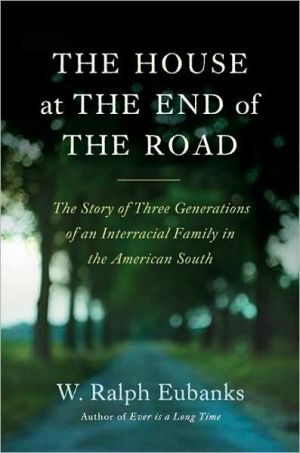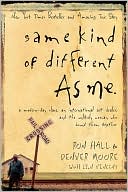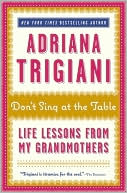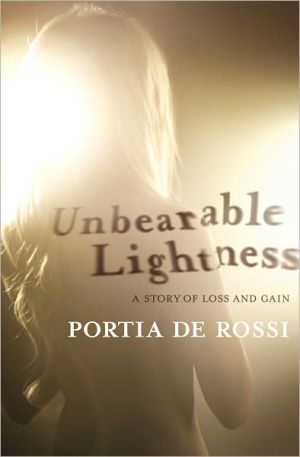The House at the End of the Road: The Story of Three Generations of an Interracial Family in the American South
A powerful story about race and identity told through the lives of one American family across three generations\ \ In 1914, in defiance of his middle-class landowning family, a young white man named James Morgan Richardson married a light-skinned black woman named Edna Howell. Over more than twenty years of marriage, they formed a strong family and built a house at the end of a winding sandy road in South Alabama, a place where their safety from the hostile world around them was assured, and...
Search in google:
A powerful story about race and identity told through the lives of one American family across three generations In 1914, in defiance of his middle-class landowning family, a young white man named James Morgan Richardson married a light-skinned black woman named Edna Howell. Over more than twenty years of marriage, they formed a strong family and built a house at the end of a winding sandy road in South Alabama, a place where their safety from the hostile world around them was assured, and where they developed a unique racial and cultural identity. Jim and Edna Richardson were Ralph Eubanks's grandparents. Part personal journey, part cultural biography, The House at the End of the Road examines a little-known piece of this country's past: interracial families that survived and prevailed despite Jim Crow laws, including those prohibiting mixed-race marriage. As he did in his acclaimed 2003 memoir, Ever Is a Long Time, Eubanks uses interviews, oral history, and archival research to tell a story about race in American life that few readers have experienced. Using the Richardson family as a microcosm of American views on race and identity, The House at the End of the Road examines why ideas about racial identity rooted in the eighteenth century persist today. In lyrical, evocative prose, this extraordinary book pierces the heart of issues of race and racial identity, leaving us ultimately hopeful about the world as our children might see it. The Sun Herald “Eubank’s memoir is written in clear, accessible prose...his straightforward manner makes the emotional issues and difficult memories all the more poignant.”
\ Dave IsayEubanks pieces together this intricate story across three generations of his family, and in turn sheds powerful new light on the complex story of race and identity in these United States. A pleasure to read, a poignant American story not to be missed.\ \ \ \ \ K. Anthony AppiahEubanks’s grandparents created an interracial family in rural Alabama nearly a century ago. Now he has taken his family’s story and used it to explore our changing AMerican ideas about what to make of our ancestries. His work should inspire all of us to think anew about our country.\ \ \ Steve YarbroughEubanks writes with a novelist’s sense of story and a poet’s eye for language and detail. Most important, though, he writes with sensitivity, understanding, and Socratic wisdom. This is not just an important book for these timse—it’s a book for all time.\ \ \ \ \ David Levering Lewis"Ralph Eubanks’s Mississippi detective story wrapped in a memoir is a remarkable journey back to the civil rights future. This wistful little book holds a significance as rich as Delta loam."\ \ \ \ \ The Sun Herald"Eubank’s memoir is written in clear, accessible prose...his straightforward manner makes the emotional issues and difficult memories all the more poignant."\ \ \ \ \ Washington PostPRAISE FOR EVER IS A LONG TIME:“A gift to everyone who reads it, a book that is at once a touching family memoir and an attempt—successful—to come to terms with the author’s past.... It is, in all respects, an exemplary and admirable piece of work.\ \ \ \ \ BookPage"Compelling...by turns a charming remembrance of a rural childhood and a chilling reminder of racism’s legacy."\ \ \ \ \ Washington PostPRAISE FOR EVER IS A LONG TIME:“A gift to everyone who reads it, a book that is at once a touching family memoir and an attempt—successful—to come to terms with the author’s past.... It is, in all respects, an exemplary and admirable piece of work.”\ \ \ \ \ BookPage“Compelling...by turns a charming remembrance of a rural childhood and a chilling reminder of racism’s legacy.”\ \ \ \ \ The Sun Herald“Eubank’s memoir is written in clear, accessible prose...his straightforward manner makes the emotional issues and difficult memories all the more poignant.”\ \ \ \ \ Library JournalThe first and most basic lesson of genealogy is to talk to your family. Eubanks (Ever Is a Long Time) interviewed his mother to start to learn about his grandparents, Edna and Jim Richardson, an interracial couple who married, lived together, and raised a family in rural Alabama in the first years of the 20th century. While Eubanks begins by seeking his grandparents' motivations and their methods for subverting societal norms, his memoir eventually broadens to a thoughtful (though still personal) exploration of the construction of race and racial identity, particularly within families that cross the color line. He considers thought-provoking questions like the potential for communication between black and white family members. Eubanks concludes, among other things, that while his own generation threw off the yoke of segregation partly by forging a proud black self-identity, his children seem to see race as a tangible but uninteresting social fact—and to them, race is far less compelling than questions of justice and fairness. VERDICT Highly recommended, especially for memoir readers or patrons interested in thoughtful and personal considerations of race.—Emily-Jane Dawson, Multnomah Cty. Lib., Portland, OR\ \








